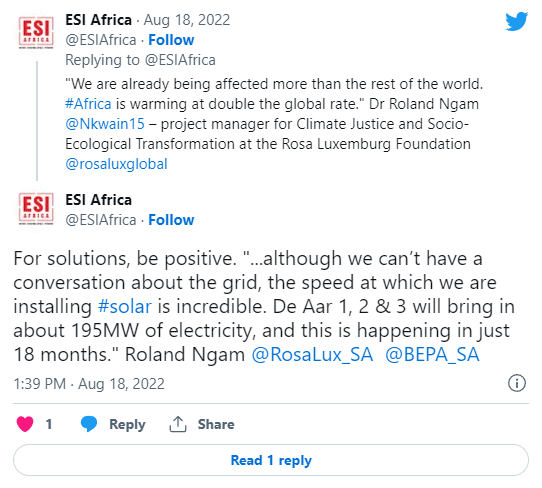· 3 min read
Louis Lagrange at the University of the Free State puts energy in its rightful place: “There are at least three pillars required to create the foundation for an economy to grow, and they must all be available: energy, transport and communication.” He adds that an economy’s growth potential is severely constrained if any of these three is missing or lacking.
Furthermore, the motivation is for each to prosper as the weakest link in a chain is the ultimate critical factor determining the strength of the chain. And now, that chain is under severe pressure as each link tackles climate change risks in its fashion.
In South Africa, the energy sector has responded to the threat with a focus on achieving a just energy transition. This requires financial backing, and luckily, the country’s Just Energy Transition Partnership (JETP) represents $8.5billion that could be mobilised over the next three to five years to support the transition to a low-carbon climate-resilient future.
While the jury is still out on how exactly this money will be used to set South Africa’s energy sector on a low-carbon pathway, changes in the energy sector affect everything from job creation to water and food security.
Let’s talk just energy in real terms
During an online discussion, Dr Roland Ngam, project manager for Climate Justice and Socio-Ecological Transformation at the Rosa Luxemburg Foundation, spoke of how the just transition is already happening in SA … but with reservations.
While enthusiastic about policy and pragmatic steps taken to date, Ngam also spoke of how upper-middle-class South Africans are getting off-grid because they can afford solar systems to meet their energy requirements.
“This has accelerated over the last two or three years. So, many people are putting up solar panels, and every time a solar system goes up, Eskom is in a better position.
“But, at the same time, what we have noticed is that the country has been discussing the cost of emerging on the other side of loadshedding.”
Ngam references the comparative expense of Karpowership’s gas power vessels, which would have cost South Africa around R218billion, versus R3bn to set up around 100MW of renewable energy capacity, which is the average cost of the solar projects in the Northern Cape.

The question – that has also been asked and answered in Europe – is why lower middle-class citizens are not getting subsidies from the government to encourage the use of solar. Ngam cites the C&I market asking why South African malls are not getting subsidised to “plaster their entire building in solar panels? South Africans are ready to play a role, but the cost should be affordable”.
According to Ngam, loadshedding has cost the country R1 trillion over the last decade, as calculated by a government agency. Therefore, he implores us to think about this lost economic growth when providing the type of solutions we want. For example, when President Ramaphosa spoke about reinventing the energy sector, he asked South African households at the end of his speech to help end loadshedding, “I was waiting for an announcement about subsidies [for the general public],” said Ngam.
“Yes, it will cost money, but some people are already doing it. But, unfortunately, it’s the rich. We need to bring in ways for people in the lower spectrum to do that. That will double our consumer spending.”
The underlying message is that as countries look to electrify everything to attain close to carbon neutral economies, there must be policies to bring everyone on the journey. Will such policy make the transition less complicated? Perhaps not, but it will exponentially increase renewable energy solutions uptake.
In the meanwhile, solar power companies can lend to the shift by sharing their knowledge and keeping their brands top of mind.
This article is also published by ESI Africa. Illuminem Voices is a democratic space presenting the thoughts and opinions of leading Sustainability & Energy writers, their opinions do not necessarily represent those of illuminem.






